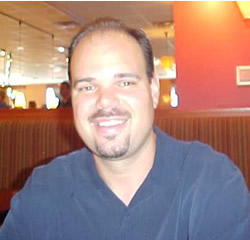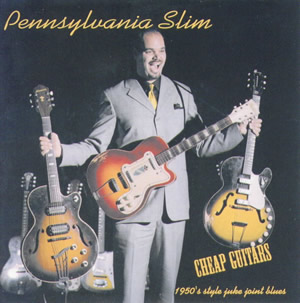The Artist as Entrepreneur |
Pennsylvania
Slim
|
Pennsylvania Slim (Brian Melching) is a self-taught musician who recollects listening to his dad's records while growing up. That's when Brian was first introduced to some of the artists who would influence his own music. His family moved back to St. Louis when Brian was a teenager. The Pennsylvania Slim Blues Band has developed a sound based on a range of rhythm and blues musicians, from Muddy Waters to Little Walter to Ray Charles. The band is a trio, which includes Slim on vocals, lead guitar, harp, and slide guitar, and two other musicians, who provide the rhythm section of an electric bass and drums. They play both covers and original songs. The band has been together for eight years and has played at the Ritz Carlton, Ameristar, BB's Jazz, Blues & Soups, and Great Grizzly Bear in the St. Louis area. They have also worked at The Slippery Noodle in Indianapolis, Bayou Bill's at Lake of the Ozarks, The Alamo in Springfield, Illinois, Martini Bar in Columbia, Missouri, and BoBo's in Mt. Vernon, Illinois. They also play at several wineries in Illinois and Missouri. In addition, Pennsylvania Slim has shared the stage with blues greats such as James Harman and Junior Watson. Brian has been married to his wife Angela for six years. They have one daughter, Katie, who is five years old and has just begun kindergarten. The following interview with Brian Melching was conducted by Cheryl Blake, UM-St. Louis, September 2004. Q. How did you get to this point in your music career? A. I first heard the music listening to my dad's records. What I liked was race music. What became rock and roll was originally rhythm and blues. My heroes included a lot of musicians. There was Robert Johnson, a 1930s guitarist from Mississippi. He was playing delta blues. He influenced Eric Clapton, who later recorded Johnson's "Crossroads Blues." Then there were people like Leadbelly, more of delta blues or country blues. Leadbelly played folk, blues, everything. Muddy Waters is another hero of mine. That's Chicago blues. Most of the people playing blues in Chicago were from Mississippi. It was delta blues, only with electric instruments. Howlin' Wolf is someone worth listening to. You'll never expect what you'll hear. His voice is incredible. Jimmy Reed put the dance and groove into the blues. There's a saying that if you put on a Jummy Reed album to listen to, you have an instant party. Then, there came more sophisticated sound. T-Bone Walker played what's called West Coast Blues, urban blues. I'm probably most influenced by him. He's blues guitar and singer first, with a jazz background, and big band thrown in. Q. When did you first find music? A. I was first turned on by fifties rock and roll, artists like Little Richard and Fats Domino. I'm the only musician in my family, and I started playing when I was twelve or thirteen. I am self-taught. About half of what the band and I play are covers of classics, but the other half are songs I have written. I don't read music. I have always just heard songs in my head. I'll remember where it is on the guitar and then the song becomes familiar. I've only had one other job. I sold shoes for about six months. And I went to broadcasting school. Otherwise, it's been my music. Q. What about the business side of your music? A. It's a tough business. When I started out, much of the pay was in cash. Now I am set up as a Limited Liability Company.
copyright 2004, Center for Entrepreneurship and Economic Education, University of Missouri-St. Louis
|

